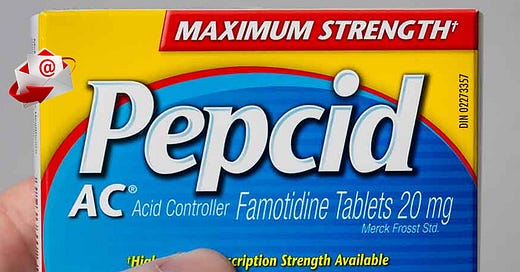★ TOP STORY
Could This Common Heartburn Drug Be a Breakthrough for Chronic Pain and Brain Fog?
While serotonin is often praised as a mood booster, new evidence suggests too much may silently sabotage your energy, trigger chronic pain, and disrupt immune balance. Discover the overlooked link - and the surprising over-the-counter remedy showing promise.
Advertisement
Our Surplus Sale Starts Now with Discounts of 20% to 50% Off
For a limited time, Take Control of Your Health® with incredible discounts on select items. Enjoy savings on high-quality, doctor-formulated essentials. Don't wait - start saving today.
📈 TRENDING NEWS
'Safe' Starch-Based Bioplastics Found to Harm Organs and Disrupt Metabolism
Research reveals 'eco-friendly' starch-based bioplastics cause organ damage and metabolic disruption even at low exposure levels. This challenges the perception that biodegradable plastics are a safe alternative to conventional plastics.
Gum Disease Symptoms Linked to Higher Risk of Multiple Chronic Illnesses
Peering into your mouth and keeping an eye out for symptoms of poor dental health is a helpful strategy to help you identify your risk of chronic diseases.
🔥 HOT
Breaking News: What You Need to Know
Up-to-date info on the latest health-related news happening in the world.
Advertisement
Want Greater Focus and Better Recollection? Try Our Nootropic Formula
Providing care and feeding for your brain require special substances that can cross your blood-brain barrier. Meet Fisetin and Spermidine, our plant-based formula that can help protect your brain and nerve cells from the normal signs of aging, including damage from oxidative stress. Gain the mental edge you deserve with greater focus, more alertness, and better recall at any age, and order your supply today.
Disclaimer: The entire contents of this website are based upon the opinions of Dr. Mercola, unless otherwise noted. Individual articles are based upon the opinions of the respective author, who retains copyright as marked. The information on this website is not intended to replace a one-on-one relationship with a qualified health care professional and is not intended as medical advice. It is intended as a sharing of knowledge and information from the research and experience of Dr. Mercola and his community. Dr. Mercola encourages you to make your own health care decisions based upon your research and in partnership with a qualified health care professional.
Mercola.com, 125 SW 3rd Place, Suite 205, Cape Coral, FL 33991
US Number: (877) 985-2695 | Intl Number: 1 (239) 599-9500
© 1997-2025 Dr. Joseph Mercola. All Rights Reserved.
*These statements have not been evaluated by the Food and Drug Administration. These products are not intended to diagnose, treat, cure, or prevent any disease.










Research shows that other risk factors for heartburn include older age, excessive body mass index (BMI), smoking, diabetes, stress, lack of sleep, anxiety/depression, and a sedentary lifestyle.
https://www.peptest.co.uk/wp-content/uploads/2021/03/2020_Boulton_et_al_A_narrative_review_of_the_prevalence_of_gastroesophageal_reflux.pdf (2021).---
Long-term shift workers may be at increased risk for GERD, but the excess risk may be explained by poor sleep quality, unhealthy behaviors, depressive symptoms, etc.
https://www.frontiersin.org/journals/public-health/articles/10.3389/fpubh.2023.1192517/full (2023).---
This study is very comprehensive: Dietary and Lifestyle Factors Related to Gastroesophageal Reflux Disease: A Systematic Review
https://www.ncbi.nlm.nih.gov/pmc/articles/PMC8055252/ (2021).-----
The studies clearly suggest that psychosocial stress may have a significant relationship with reflux esophagitis and may potentially play a role in symptom presentation and natural history. There is a close association between stress and reflux esophagitis, and there is a strong possibility that patients with refractory GERD may have comorbid psychosocial health problems. Stress may include increased levels and frequency of esophageal acid exposure, inhibition of gastric acid emptying, or stress-induced hypersensitivity. A mindfulness-based intervention for anxiety symptom relief and quality of life in gastroesophageal reflux disease. https://www.ncbi.nlm.nih.gov/pmc/articles/PMC3576549/ (2013).---
https://www.sciencedirect.com/science/article/abs/pii/S0016508507021713 (2008).---
https://gut.bmj.com/content/56/9/1191.short (2007)
https://mspsss.org.ua/index.php/journal/article/view/21 (2018).---
https://www.sciencedirect.com/science/article/pii/S2666149723000208 (2023).--
https://www.sciencedirect.com/science/article/pii/S2666149723000208 (2023).--
Miscellaneous Endogenous and exogenous stressors that disrupt gastrointestinal physiological functions and promote inflammation, tissue damage, ulceration, gastrointestinal bleeding, gastroesophageal reflux disease (GERD), irritable bowel disease (IBD), and gastritis.
http://www.melatonin-research.net/index.php/MR/article/view/120 (2021)
The protective role of melatonin on the gastric mucosa is due to the inhibition of gastric acid and pepsin secretion. Gastric acid and pepsin are two important invasive factors in the pathogenesis of gastric ulcers and are associated with stress-induced gastric mucosal injury. In animal models of chronic gastric fistula disease, melatonin has been observed to reduce gastric acid and also increase plasma gastrin levels.
It is suggested that this inhibitory effect of melatonin is related to the central nervous system. Melatonin is also believed to control alkaline secretion in the presence of acid in the lumen. Melatonin has been shown to protect the gastrointestinal mucosa by stimulating the production of mucosal HCO-3 by triggering the release of intracellular Ca+2 from enterochromatic cells.
In the link: ----1) Melatonin and mucosal protection and ulcer healing. ----2) Melatonin and Helicobacter pylori. ----3) Melatonin and stomach cancer. ----4) Melatonin and intestinal functions. ----5) Melatonin's effects on intestinal bacteria and the bacteria's effects on the amount of melatonin. ----6) Melatonin and irritable bowel syndrome. ----7) Melatonin and inflammatory bowel disease. ----8) Melatonin and colorectal carcinoma. ----9) The role of melatonin in liver. ---10) Melatonin and pancreas. ----11) Melatonin and appetite.
https://www.mednews.care/wp-content/uploads/2024/02/therapeutic-applications-of-melatonin-in-disorders-related-to-the-gastrointestinal-tract-and-control-of-appetite.pdf (2024).--
I used to take Pepcid AC a few years ago for acid indigestion because I think Tums may have contributed to my kidney stones. But I switched to fermented apple cider vinegar capsules which seem to work fine. I don't remember why I stopped taking Pepcid AC, something I read maybe? Anyway, I think I'll try it again since it appears safe. Hopefully it won't react badly with the methylene blue I've been taking for several months now. I remember something about not taking methylene blue if you take SSRIs so I don't know if that would apply to Pepcid AC as well. I don't get acid reflux much anymore so I won't need much.